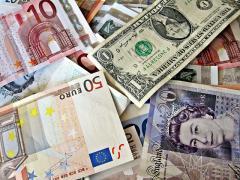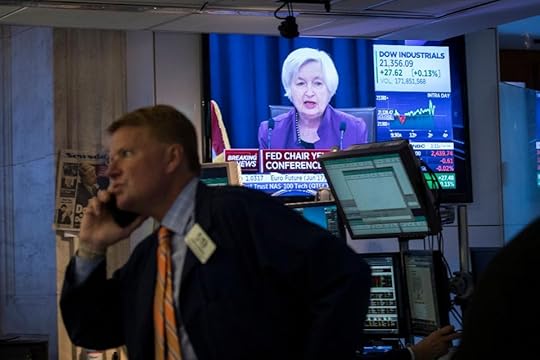Steve Bull's Blog, page 1353
June 29, 2017
Filipinos May Soon Be Jailed for Not Singing the National Anthem Enthusiastically
( ANTIMEDIA ) — New legislation that would make enthusiastic singing of the national anthem mandatory in the Philippines has been approved by the Philippine House of Representatives. The act, known as the “Revised Flag and Heraldic Code” is a revision of an existing bill that will require all persons to stand, salute, and sing when the national anthem is played at a public event. “The singing shall be mandatory and done with fervor,” it states.
The legislation provides the official lyrics and music for the Lupang Hinirang, specifies a tempo of 100-120 beats per minute, and demands a proper salute from the first note of the song to the last. Also outlined are a number of other strict guidelines regarding flag code, the national motto, and the display of other emblems. In addition, the school system is required to make memorization of the anthem compulsory for all students.
Those who violate any of the rules or regulations outlined in the act will be issued a warning before being publicly shamed in a “newspaper of general circulation,”and it will be left to the discretion of the court to impose either a fine of 50,000-100,000 pesos ($2,800-$5,590) or no more than one year in prison — or both. The bill stipulates that both fine and imprisonment will be mandatory for repeat offenders. “Any act which casts contempt, dishonour or ridicule upon the national anthem shall be penalized,” the bill says.
“The national anthem embodies and expresses the aspirations, dreams, ideals, longings, commitment and determination, nationalism and patriotism, sentiment and spirit of the people,” said Maximo Rodriguez Jr., one of the authors of the bill.
The legislation has been sent to the Philippine Senate for approval.
June 28, 2017
Shrinkflation In Ireland – Real Inflation Much Higher Than Reported
Shrinkflation – Real inflation much higher than reported and realised
Shrinkflation is taking hold in consumer sector
Important consumer, financial, monetary and economic issue being largely ignored by financial analysts, financial advisers, economists, central banks and the media.
Food becoming more expensive as consumers get less for price paid
A form of stealth inflation, few can avoid it
Brexit is the scapegoat for shrinkflation by the media and companies
Consumers blame retailers rather than central banks
Gold hedge has doubled in value since 2007

Editor: Mark O’Byrne
Shrinkflation: no one left untouched
600 new words entered our official lexicon this week as the Oxford English Dictionary announced the latest new additions to their online records.
One of the words reportedly up for consideration was shrinkflation. It did not make the final cut and as a result continues to be defined by the authority as ‘a portmanteau, made from combining shrink: ‘to become or make smaller in size’, with the economic sense of inflation: ‘a general increase in prices and fall in the purchasing value of money’.
In order for a word to be accepted into the OED it must have been in use for at least five years. But the latest list suggests that this isn’t the case and exceptions can be made. The inclusion of ‘superbrat’, a word which is usually associated with the behaviour of John McEnroe in the 1970s, actually dates back to the the 1950s.
Yet, shrinkflation continues to elude the world’s authority on the English language. This seems bizarre to us given both the word and the phenomenon and something consumers have been experiencing for a number of years.
Although it is understandable in the context of an important consumer, financial and economic issue which is being largely ignored by financial analysts, financial advisers, economists and the media.
…click on the above link to read the rest of the article…
Myths Behind the War on Cash

The attacks on physical cash from a phalanx of economists, central bankers, commercial banks, and politicians have not diminished in recent years. On the contrary, in the face of the worldwide increase in terror attacks, particularly in Europe, and ongoing pressure on public budgets, the cash ban issue is increasingly dragged into the spotlight.
In a highly-recommended study entitled “Cash, Freedom and Crime. Use and Impact of Cash in a World Going Digital,” Deutsche Bank Research demolishes numerous popular myths surrounding cash, inter alia in the context of crime and terrorism. Without cash there are no longer bank robberies at gun point, instead there are now electronic bank robberies. Fraud involving credit cards and ATM cards is massively increasing in Sweden, the country considered the pioneer of the cashless society. The argument that adopting a cashless payment system would facilitate the fight against terrorism doesn’t hold water either:
As regards terrorism in Europe, an analysis of 40 jihadist attacks in the past 20 years shows that most funding came from delinquents’ own funds and 75% of the attacks cost in total less than USD 10,000 to carry out — sums that will hardly raise suspicions even if paid by card.
Moreover, many terrorists, particularly if they are prepared to risk their own death, won’t be deterred by prohibitions, just as stricter gun laws have no impact on people who must use unregistered weapons for their crimes. Often, they are unable to get hold of a weapon by legal means anyway if they have a criminal record. Planned terror attacks are as a rule characterized by a meticulous and careful approach. At best a cash ban might make financing of terrorism more difficult (even that is doubtful), but at the price of subjecting the law-abiding peaceful population at large to even more intrusive surveillance.
…click on the above link to read the rest of the article…
Oil Industry To Waste Trillions As Peak Demand Looms

ExxonMobil and its peers risk blowing $2.3 trillion on oil projects that will not be needed if the world hits peak demand in the next decade.
A new report from The Carbon Tracker Initiative analyzed what would happen if the oil market saw demand peak by 2025, a scenario that would be compatible with limiting global warming to just 2 degrees Celsius. The headline conclusion is that about one-third of the global oil industry’s potential spending – or about $2.3 trillion – would not be needed. In other words, the oil industry is on track to waste a massive pile of money if demand peaks in less than ten years.
Of course, the vulnerability to peak demand varies by company. Carbon Tracker surveyed 69 global oil and gas companies, and their exposures range from 10 to 60 percent of their potential spending. That is, 10 to 60 percent of their spending could be unnecessary or wasteful if demand peaks by the middle of the next decade. The latest report adds more detail to the “stranded assets” theory – the notion that large volumes of oil will be left in the ground because demand peaks, whether because of alternatives or climate regulation, or both.
Some medium-sized companies like Southwestern Energy and Apache Corp. topped the list with 60 to 70 percent of their potential upstream capex vulnerable in a peak demand scenario. As for the oil majors, ExxonMobil would be the most vulnerable to peak demand, with about half of its potential spending through 2025 unneeded. Other oil majors fare a bit better, although not by much. Chevron, Eni and Shell could see 30 to 40 percent of their capex spent on wasted projects.
Which projects are subject to redundancy largely comes down to economics. U.S. shale drilling has seen dramatic costs declines, pushing some higher-cost projects out of the range of viability in this scenario.
…click on the above link to read the rest of the article…
Top Canadian Court Permits Worldwide Internet Censorship
A country has the right to prevent the world’s Internet users from accessing information, Canada’s highest court ruled on Wednesday.
In a decision that has troubling implications for free expression online, the Supreme Court of Canada upheld a company’s effort to force Google to de-list entire domains and websites from its search index, effectively making them invisible to everyone using Google’s search engine
The case, Google v. Equustek, began when British Columbia-based Equustek Solutions accused Morgan Jack and others, known as the Datalink defendants, of selling counterfeit Equustek routers online. It claimed California-based Google facilitated access to the defendants’ sites. The defendants never appeared in court to challenge the claim, allowing default judgment against them, which meant Equustek effectively won without the court ever considering whether the claim was valid.
Although Google was not named in the lawsuit, it voluntarily took down specific URLs that directed users to the defendants’ products and ads under the local (Canadian) Google.ca domains. But Equustek wanted more, and the British Columbia Supreme Court ruled that Google had to delete the entire domain from its search results, including from all other domains such Google.com and Google.go.uk. The British Columbia Court of Appeal upheld the decision, and the Supreme Court of Canada decision followed the analysis of those courts.
EFF intervened in the case, explaining [.pdf] that such an injunction ran directly contrary to both the U.S. Constitution and statutory speech protections. Issuing an order that would cut off access to information for U.S. users would set a dangerous precedent for online speech. In essence, it would expand the power of any court in the world to edit the entire Internet, whether or not the targeted material or site is lawful in another country.
…click on the above link to read the rest of the article…
New Device Allows Cops to Download All of Your Smartphone Activity in Seconds
(ANTIMEDIA) New York — “Any person who operates a motor vehicle in the state shall be deemed to have given consent to field testing of his or her mobile telephone and/or personal electronic device for the purpose of determining the use thereof while operating a motor vehicle, provided that such testing is conducted by or at the direction of a police officer.”
That’s language from the text of a bill currently working its way through the New York state legislature. The legislation would allow cops to search through drivers’ cell phones following traffic incidents — even minor fender-benders — to determine if the person was using their phone while behind the wheel.
Most states have laws banning the use of mobile devices while driving, though such laws are rarely enforced. This is largely because it’s nearly impossible to catch someone in the act. What person would admit to an officer that they broke the law, the argument goes, particularly when it’s after the fact? After all, cops don’t show up until after the accident occurs.
Now, technology exists that would give police the power to plug drivers’ phones into tablet-like devices — being called “textalyzers” in the media — that tell officers exactly what they were doing on their phone and exactly when they were doing it. And if the readout shows a driver was texting while driving, for instance, the legal system will have an additional way to fine them.
“Recording your every click, tap or swipe, it would even know what apps you were using. Police officers could download the data, right on the spot,” Jeff Rossen of NBC News said in a video report on the technology.
…click on the above link to read the rest of the article…
There Is No Excuse For Janet Yellen’s Complacency
Janet Yellen has been reported by Reuters as saying in London yesterday that “she does not believe that there will be a run on the banking system at least as long as she lives”:
“Would I say there will never, ever be another financial crisis? You know probably that would be going too far but I do think we’re much safer and I hope that it will not be in our lifetimes and I don’t believe it will be,” Yellen said at an event in London. “Fed’s Yellen: Not another financial crisis in ‘our lifetimes’”
The only word I can use to describe this belief is “delusional.”

NEW YORK, NY – JUNE 14: Traders work as a television monitor displays Federal Reserve Chair Janet Yellen announcing the Fed’s decision to raise interest rates on the floor of the New York Stock Exchange (NYSE) June 14, 2017 in New York City. The Federal Reserved raised interest rates today .25 percent for a new target range of 1 percent to 1.25 percent. (Photo by Drew Angerer/Getty Images)
The only way in which her belief could be justified would be in financial crises were truly random events, caused by something outside the economy—or just by a very bad throw of the economic dice.
This is indeed the perspective of mainstream “Neoclassical” economic theory, in which Yellen was trained, and because of which she was deemed eligible—and indeed eminently suitable—to Chair the Federal Reserve.
This is the theory that led the OECD to proclaim, two months before the crisis began in August 2007, that “the current economic situation is in many ways better than what we have experienced in years”, and that they expected that “sustained growth in OECD economies would be underpinned by strong job creation and falling unemployment.” (OECD, June 2007, “Achieving Further Re-balancing”).
…click on the above link to read the rest of the article…
History’s Biggest “Butterfly Effect” Occurred On This Day
Posted on June 27, 2017by
The butterfly effect is the concept that small causes can have large effects. Initially, it was used with weather prediction but later the term became a metaphor used in and out of science.
In chaos theory, the butterfly effect is the sensitive dependence on initial conditions in which a small change in one state of a deterministic nonlinear system can result in large differences in a later state. The name, coined by Edward Lorenz for the effect which had been known long before, is derived from the metaphorical example of the details of a tornado (exact time of formation, exact path taken) being influenced by minor perturbations such as the flapping of the wings of a distant butterfly several weeks earlier. Lorenz discovered the effect when he observed that runs of his weather model with initial condition data that was rounded in a seemingly inconsequential manner would fail to reproduce the results of runs with the unrounded initial condition data. A very small change in initial conditions had created a significantly different outcome. — Wikipedia
On this day in history, June 28, 1914, the driver for Archduke Franz Ferdinand, nephew of Emperor Franz Josef and heir to the Austro-Hungarian Empire, made a wrong turn onto Franzjosefstrasse in Sarajevo.
Just hours earlier, Franz Ferdinand narrowly escaped assassination as a bomb bounced off his car as he and his wife, Sophie, traveled from the local train station to the city’s civic city. Rather than making the wrong turn onto Franz Josef Street, the car was supposed to travel on the river expressway allowing for a higher speed ensuring the Archduke’s safety.
Yet, somehow, the driver made a fatal mistake and tuned onto Franz Josef Street.
…click on the above link to read the rest of the article…
June 27, 2017
The Most Dangerous Fake News of All is Peddled by the Corporate Media

This is not the sort of thing you see in a confident, brave, and civilized nation, it’s the sort of stuff you’d expect to see toward the end. It’s the stuff of craven war-mongers, of dishonest cowards, of a totally deranged and very dangerous media. The signs are everywhere; imperial decline is set to accelerate rapidly in the coming years.
– From the April post: Prepare for Impact – This is the Beginning of the End for U.S. Empire
Fake news, propaganda and garbage information is everywhere and I’m not going to pretend otherwise. That being said, the key thing to understand is fake news from obscure websites you’ve never heard of is not what represents the real, global danger of rampant dishonest information. The real danger of fake news is the stuff that’s consistently being vomited onto the pages of “respectable,” billionaire-owned corporate media.
Obscure blogs and independent thinkers such as myself aren’t influencing foreign policy, domestic policy or anything that really matters (look around you). While alternative media did indeed play a monumental role in the election of Donald Trump, how much really changed when it comes to the true power centers?
Not much, not much at all. Goldman Sachs and Wall Street are more in control than ever before, and neocons and other assorted interventionists seem to be running foreign policy.
All of this reminds me of the famous saying, “if voting made any difference, they’d make it illegal.” Indeed, the time has come for all of us to own up to the very real and present danger of corporate media, which seemingly exists to provide public relations for oligarchs and the foreign policy establishment.
…click on the above link to read the rest of the article…
Peter Schiff Warns: “They’re Not Afraid Of Collapsing The Bubble On Trump’s Watch”
Investors like Peter Schiff have been predicting the collapse of the American economy for a long time, and for good reason. If an economy is built on a foundation of borrowed money, then that economy is living on borrowed time. However, despite how fundamentally unsustainable our financial system is, it has somehow defied all expectations. It has gone on far longer than any of us could have imagined.
But that could easily change under Trump. Schiff explains in a recent interview with Alex Jones and Dr. Jerome Corsi, that President Trump is the perfect scapegoat for the coming economic collapse. The establishment loathes him, and there’s plenty of evidence to suggest that they’re trying to pop the financial bubble that they created, while he is still in office.
“It’s interesting that during the entire term where Obama was president, the Fed really only raised rates once. I mean, they raised them a second time, but that’s after the election. Since trump was elected they’ve already had three rate hikes and they’re planning on doing more.
But the low interest rates were part of the problem. The Fed needs to raise interest rates, but when they do that, the economy is going to collapse. The whole bubble, the recovery was phony, we don’t want to keep the phony recovery going. We want to let it implode so we can have a real recovery built on a solid foundation.”
However, Trump’s decision to credit himself for the latest gains in the stock market, as well as a lower unemployment rates, is playing right into the hands of the establishment.
…click on the above link to read the rest of the article…




